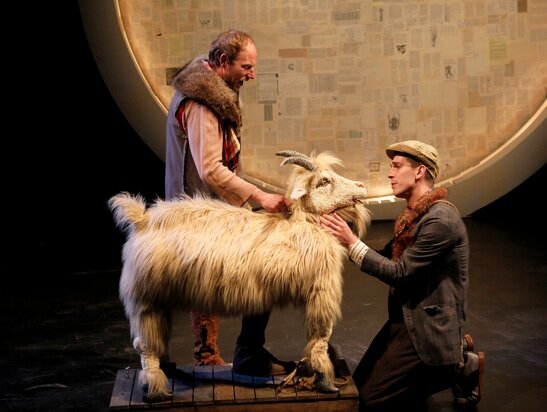
I keep trying to think of what to compare O Lovely Glowworm (Or, Scenes of Great Beauty) to and coming back to Pynchon’s Gravity’s Rainbow. Every so often, an artist will try to eat the world, and go a little (okay, rather a lot) mental in the process.
Glen Berger’s Glowworm is not nearly as long (though it is two and half hours), and it doesn’t feature a shadowy conspiracy, but it does reach back to a World War, and just as Pynchon pressed language into the shape he wanted, Berger presses creaky-beamed theatre, with all its artifice, into the service of sincerity. (It’s ironic that just now he’s more famous for co-writing the book for Broadway’s notorious Spider Man – Turn Off the Dark.)
New Century Theatre Company‘s production of O Lovely Glowworm (through May 14 at Erickson Theatre Off Broadway; tickets) is one of the best shows I’ve seen this year. It’s by no means perfect, but it shrugs off imperfections (like variable Irish accents) through the commitment of its performers. You need commitment if you’re playing a dead goat infested with maggots and lice, as does Michael Patten (shown operating the stuffed goat puppet, above).
The show makes demands on the audience, too, besides that of patience. During a post-show talk, the actors mentioned that they had to focus on emotional through-lines, rather than an overarching plot. (There is one, but you glean it, rather than follow it.) At intermission, the lobby was abuzz with people trying out interpretations of events, but they weren’t frustrated–they were intrigued.
Let me explain a little of how things go: First, you meet the Goat (Patten), who tells you in no uncertain terms that while he’s just now aware, and somewhat amnesiac, he’s sure he’s anything but a goat tethered to a garbage heap outside of an Irish cottage, chewing on wrappers and catalogs. That, he feels, would be the worst. He is, however, in terrible pain and to distract himself, he conjures up scenes of great beauty.
That’s how you first meet hapless WWI deserter Marveaux (MJ Sieber), lying as if dead in a field, and then the young, goat-owning, would-be inventor MacMann (Brian Claudio Smith) who is a “miserable boy,” according to his sick-abed Mother (Gretchen Krich, knocking it out of the park), who would do anything for him.

Later, Marveaux runs into a mermaid named Philomel (Jennifer Lee Taylor, serving up Kate Hepburn’s brainy panache), who’s floating on a bar of soap in a lake, enticing men into drowning, and fights over her with his best friend Halliwell (a boisterous Peter Dylan O’Connor), who’s tracked him down to return him to the regiment. There’s also a taxidermist, and a love interest for MacMann.
The scenes of great beauty have all the logical causal sequence you might expect from a scene dramatized by a pain-crazed goat on a garbage heap: They generate from emotional conflict and desiderata, which Berger underscores with the language of advertisement, and resolve like dreams–people expire, re-expire, and revive. You get just enough clues to construct in your own head the “reality” that has birthed this outpouring, but it’s not really about connecting the dots–it’s the journey with these people as they grow older, grasp for things, and wonder if this is all there is.
Director Roger Benington also did the scenic design, in the key of magical penury (as an aside, the production was funded 97 percent through individual donation)–there’s a paper moon, several large swans, and a large bar of soap in a lake. The swans turn to reveal cottage interiors on their reverse. Costume designer Harmony Arnold has outfitted everyone in mostly-period clothing, with touches of furred whimsy. Sound designer Rob Witmer provides everything from a thunderstorm to a Victrola, while lighting designer Andrew D. Smith does pools of moonlight and gas lamp light.
Thanks to Benington’s pacing, the 155 minutes never drags, and he wisely takes the time for tomfoolery (there are some epic fights that might remind you that rolling ball of fists in an Andy Capp comic) to lighten the heart-bruising beauty of MacMann’s Mother’s last gift, or the great beauty of a glowworm being cast on a fishing line, ending up in smaller and smaller glowing bits, but still shining.
